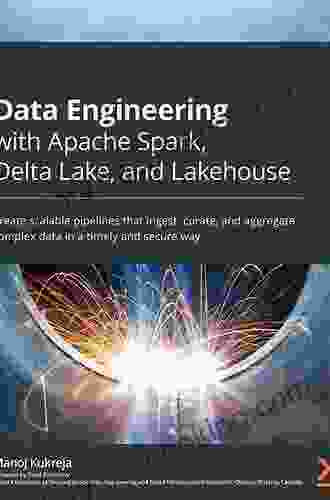Create Scalable Pipelines That Ingest, Curate, and Aggregate Complex Data In

In today's data-driven world, organizations are faced with the challenge of managing and extracting value from increasingly complex and diverse data sources. Building scalable pipelines that can ingest, curate, and aggregate this data is crucial for empowering businesses to make informed decisions, gain insights into customer behavior, and drive innovation. 4.4 out of 5 This comprehensive guide will delve into the essential principles and best practices for creating scalable data pipelines. We will explore the various stages of data ingestion, curation, and aggregation, providing practical insights and real-world examples to help you design and implement robust pipelines that meet the demands of your organization. The first step in building a data pipeline is data ingestion, the process of collecting and importing data from multiple sources into a central repository. This can include structured data from databases, unstructured data from text files and logs, and semi-structured data from social media and IoT devices. To ensure efficient and reliable data ingestion, it is essential to consider the following: Once data has been ingested, the next step is data curation, the process of cleaning, transforming, and enriching data to make it ready for analysis and decision-making. Data curation involves the following tasks: Data aggregation involves combining data from different sources into a single, unified dataset. This is a critical step for gaining a comprehensive view of your data and identifying patterns and trends that may not be apparent when analyzing data from individual sources. To effectively aggregate data, consider the following: As data volumes and the complexity of data processing tasks increase, it is essential to design data pipelines with scalability and performance in mind. To achieve scalability, consider the following: To ensure optimal performance, consider the following: Building scalable data pipelines that can effectively ingest, curate, and aggregate complex data is a critical undertaking for organizations seeking to unlock the full potential of their data. By following the principles and best practices outlined in this guide, you can design and implement robust data pipelines that empower your organization to make better decisions, innovate faster, and gain a competitive advantage in today's data-driven market.Language : English File size : 54566 KB Text-to-Speech : Enabled Screen Reader : Supported Enhanced typesetting : Enabled Print length : 480 pages Data Ingestion: Gathering Data from Diverse Sources
Data Curation: Transforming Raw Data into Meaningful Insights
Data Aggregation: Combining Data from Multiple Sources
Scalability and Performance Considerations
4.4 out of 5
| Language | : | English |
| File size | : | 54566 KB |
| Text-to-Speech | : | Enabled |
| Screen Reader | : | Supported |
| Enhanced typesetting | : | Enabled |
| Print length | : | 480 pages |
Do you want to contribute by writing guest posts on this blog?
Please contact us and send us a resume of previous articles that you have written.
 Book
Book Novel
Novel Page
Page Chapter
Chapter Text
Text Story
Story Genre
Genre Reader
Reader Library
Library Paperback
Paperback E-book
E-book Magazine
Magazine Newspaper
Newspaper Paragraph
Paragraph Sentence
Sentence Bookmark
Bookmark Shelf
Shelf Glossary
Glossary Bibliography
Bibliography Foreword
Foreword Preface
Preface Synopsis
Synopsis Annotation
Annotation Footnote
Footnote Manuscript
Manuscript Scroll
Scroll Codex
Codex Tome
Tome Bestseller
Bestseller Classics
Classics Library card
Library card Narrative
Narrative Biography
Biography Autobiography
Autobiography Memoir
Memoir Reference
Reference Encyclopedia
Encyclopedia Sophie Cunningham
Sophie Cunningham Vesta L Giles
Vesta L Giles Mark Matthews
Mark Matthews Ludwig Von Mises
Ludwig Von Mises Marco Dragovic
Marco Dragovic Manjit Kumar
Manjit Kumar Gina Chen
Gina Chen Madeline Milne
Madeline Milne Margaret Owen
Margaret Owen Sarah Hazell
Sarah Hazell Nathalia Holt
Nathalia Holt Marc F Bellemare
Marc F Bellemare Richard Del Connor
Richard Del Connor Malaka Gharib
Malaka Gharib Melanie Burnell
Melanie Burnell Scott Fearon
Scott Fearon Matthew Guay
Matthew Guay Margo Weinstein
Margo Weinstein Lisa Schadt
Lisa Schadt Larry Slawson
Larry Slawson
Light bulbAdvertise smarter! Our strategic ad space ensures maximum exposure. Reserve your spot today!

 Alvin BellMaster the Guitar with Ease: "Complete Quick and Easy Beginner Guitar Method"...
Alvin BellMaster the Guitar with Ease: "Complete Quick and Easy Beginner Guitar Method"... Adam HayesFollow ·3.5k
Adam HayesFollow ·3.5k Jackson BlairFollow ·13.9k
Jackson BlairFollow ·13.9k Richard SimmonsFollow ·11.4k
Richard SimmonsFollow ·11.4k Eddie PowellFollow ·4.6k
Eddie PowellFollow ·4.6k Glen PowellFollow ·17.7k
Glen PowellFollow ·17.7k Zachary CoxFollow ·4k
Zachary CoxFollow ·4k Houston PowellFollow ·19.8k
Houston PowellFollow ·19.8k Andres CarterFollow ·12.3k
Andres CarterFollow ·12.3k

 Truman Capote
Truman CapoteShort, Skinny Mark Tatulli: The Ultimate Guide to a...
Are you tired of being...

 Robert Heinlein
Robert HeinleinEmbark on an Unforgettable Cycling Adventure: The Classic...
Explore the Timeless...

 Bryce Foster
Bryce FosterMisty Twilight: Marguerite Henry's Enduring Masterpiece
A Literary Legacy that...

 Anton Chekhov
Anton ChekhovUnleash the Explosive Power of DC Comics Bombshells 2024...
Prepare yourself for an...

 Juan Butler
Juan ButlerUnleash the Thrill: Discover 'Know Your Rider' by...
Prepare yourself for an...
4.4 out of 5
| Language | : | English |
| File size | : | 54566 KB |
| Text-to-Speech | : | Enabled |
| Screen Reader | : | Supported |
| Enhanced typesetting | : | Enabled |
| Print length | : | 480 pages |












